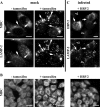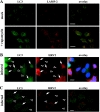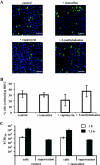Induction of autophagy does not affect human rhinovirus type 2 production
- PMID: 17670838
- PMCID: PMC2045498
- DOI: 10.1128/JVI.00143-07
Induction of autophagy does not affect human rhinovirus type 2 production
Abstract
Induction of autophagy has been shown to be beneficial for the replication of poliovirus, a phenomenon that might also apply for other picornaviruses. We demonstrate that de novo synthesis of human rhinovirus type 2 (HRV2), an HRV of the minor receptor group, is unaffected by tamoxifen, rapamycin, and 3-methyladenine (3-MA), drugs either stimulating (tamoxifen and rapamycin) or inhibiting (3-MA) autophagic processes. Furthermore, LC3-positive vesicles (i.e., autophagosomes) are not induced upon infection. Therefore, multiplication of this particular picornavirus is not dependent on autophagy.
Figures



References
-
- Brabec, M., D. Blaas, and R. Fuchs. 2006. Wortmannin delays transfer of human rhinovirus serotype 2 to late endocytic compartments. Biochem. Biophys. Res. Commun. 348:741-749. - PubMed
-
- Bursch, W., K. Hochegger, L. Torok, B. Marian, A. Ellinger, and R. S. Hermann. 2000. Autophagic and apoptotic types of programmed cell death exhibit different fates of cytoskeletal filaments. J. Cell Sci. 113:1189-1198. - PubMed
-
- Gonzalez-Polo, R. A., P. Boya, A. L. Pauleau, A. Jalil, N. Larochette, S. Souquere, E. L. Eskelinen, G. Pierron, P. Saftig, and G. Kroemer. 2005. The apoptosis/autophagy paradox: autophagic vacuolization before apoptotic death. J. Cell Sci. 118:3091-3102. - PubMed
Publication types
MeSH terms
Substances
LinkOut - more resources
Full Text Sources

